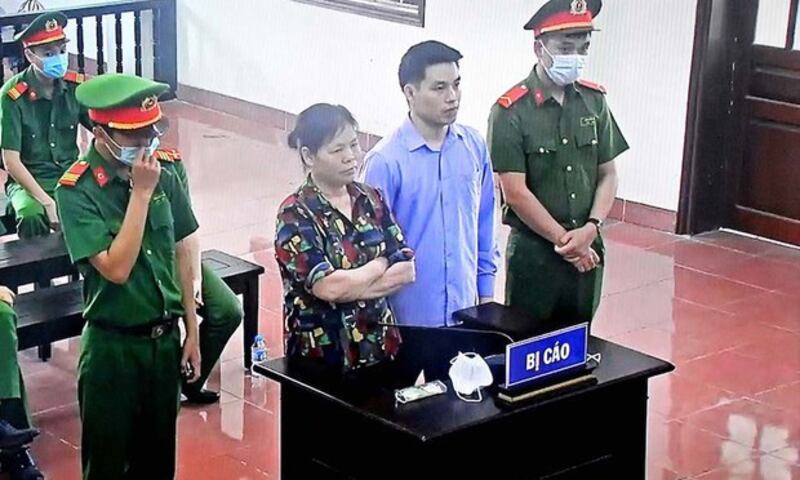Vietnamese land-rights activist Can Thi Theu is being held under harsh jail conditions following her sentencing to eight years in prison for criticizing the government over its handling of a deadly land-rights clash last year, her daughter said Monday.
Trinh Thi Thao, Theu’s daughter, told RFA’s Vietnamese Service that her mother is currently in a police detention center in the seat of northern Vietnam’s Hoa Binh province, where she has been placed in “small cells” with “HIV-infected prisoners,” despite being jailed for political reasons.
“The cells are so small, only seven square meters (75 square feet), but houses up to 13 people,” she said, adding that she had received updates about the condition from one of her mother’s fellow inmates.
“My mother has to share it with infected people. [It’s summer now in Vietnam but] prisoners don’t have enough water to use, and the cell doors are always closed, making it very hot and stuffy. It’s very cruel to treat prisoners that way. My family is very indignant.”
During her trial on May 5, Theu told the court that when her cellmates fought, she had attempted to separate them and was injured in the fighting, causing her to bleed. Her request to be tested afterward for possible infection was turned down by detention center officials, she said at the time.
Thao also said that her family had been encountering difficulty in sending foods and other items to her mother.
Attempts by RFA to contact the Hoa Binh Police Department and the city’s Police Detention Center by telephone went unanswered Monday.

2020 arrest
A well-known activist in Hanoi, Theu was arrested on June 24, 2020, with her sons Trinh Ba Tu and Trinh Ba Phuong on charges of “creating, storing, and disseminating information, documents, items and publications opposing the Socialist Republic of Vietnam” under Article 117 of Vietnam’s Penal Code.
The three family members had been outspoken in social media postings about the Jan. 9, 2020 clash in Dong Tam commune in which 3,000 police stormed barricaded protesters’ homes at a construction site about 25 miles south of the capital, killing a village elder.
They had also offered information to foreign embassies and other international groups to try to raise awareness of the incident.
Three police officers also died in the clash.
Theu and her son Trinh Ba Tu, who worked to raise awareness of the socially and politically explosive issue of land grabs in the country of 95 million people, were sentenced on May 5 to eight years in prison each for “creating, storing and disseminating information and materials against the Socialist Republic of Vietnam” under Article 117 of Vietnam’s Penal Code. Their jail time will be followed by three years each on probation.
Immediately following the trial, Theu and her son appealed the verdict.
Call for international pressure
Speaking to RFA on Monday, Trinh called on the international community to pressure Vietnam’s government to release her mother and brother.
“If many people speak up, they will stop doing cruel things, including detaining [healthy prisoners] with HIV/AIDS-infected prisoners, and my mother and younger brother will be kept in better conditions,” she said.
In a statement following her trial, rights group Amnesty International condemned the sentences handed down to Theu—who had been jailed twice before in 2014 and 2016 for protesting government-ordered seizures of land—and her son, calling their conviction “a travesty of justice.”
While all land in Vietnam is ultimately held by the state, land confiscations have become a flashpoint as residents accuse the government of pushing small landholders aside in favor of lucrative real estate projects, and of paying too little in compensation to farming families displaced by development.
Reported by RFA’s Vietnamese Service. Translated by Anna Vu. Written in English by Joshua Lipes.

